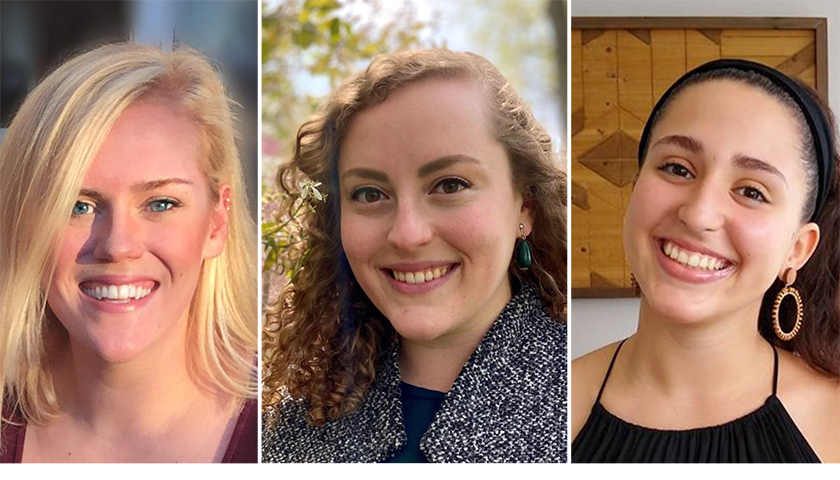Students’ COVID-19 Research Distributed to Congressional Policy Makers
Over 65 percent of the nation’s essential workers—including doctors, nurses, food service workers, and transportation workers—are from the immigrant workforce, according to research on the impact of COVID-19 on immigrant families.
The research, developed by Suffolk University students in the Youth Development in Context Lab, also shows that many members of America’s larger immigrant communities may not have access to adequate health care or worker rights protections because of their legal vulnerability.

Giving voice to the forgotten
“This research is so important because it highlights growing inequality and is a voice for those who may be easily forgotten or ignored during a crisis such as this,” said Marit Murry, a second-year student in Suffolk’s Clinical Psychology PhD program. “I hope we can inform more people and influence policies that translate to services and safety nets for these communities.”
Some of the findings, along with those of Rutgers University researcher Liwei Zhang, were highlighted in a fact sheet published by Penn State University’s Research to Policy Collaboration newsletter and delivered to 2,500 congressional staffers throughout the United States.
“What students learned from this real-world project is that you have to work together and quickly when dealing with a crisis situation,” said Professor Amy Marks, chair of the Psychology Department. “They did a terrific job presenting solid research findings, and that’s important because our policy leaders need to know that research in order to make sound policy decisions.”
Job loss and health concerns
The policy brief “What we know about the social and emotional impacts of COVID-19 on Immigrant Families” reveals that the Latinx community has been particularly affected in terms of job loss, with fewer than one in five Latinx adults able to work safely from home. Furthermore, Asian youth are exposed to particularly high levels of racism, xenophobia, and hate crimes, with more than 1,000 hate crimes reported in the month of April alone.
In the policy brief “While COVID-19 does not discriminate, immigration status does determine families’ and children’s health and well-bring,” Suffolk students reported on access to health care and worker rights protections. The study also shows that suspension of immigration benefits processing and complications from travel bans and halted activities at US Embassies are adding to the psychological and economic stress for many immigrant households.
Pandemic policy changes
“The more we researched, the more we witnessed how the information and policies were rapidly evolving in a matter of days,” said first-year clinical student Regina Roberg, who said participating in the outside-the-classroom research project enabled her to “apply my existing knowledge to a current problem” and share new information within a group setting.
“Hopefully, our research will help inform policy decisions at the state and national levels to help mitigate the pandemic’s tremendous economic and physical burden on immigrant parents and their children,” said Roberg.
Undergraduate student Zuna Ramos Maza also contributed to the project.
“Collaborating on this project was special, because the briefs landed in the hands of congressmen and women who have the power to impact the lives of others,” said Maza, Class of 2023, a political science major. “Working on the briefs really strengthened my thinking skills, specifically being able to think one step ahead and while under pressure.”
Lending a helping hand
In addition to creating the policy briefs, Marks and her students raised funds for the Metrowest Worker Center, which has been delivering groceries and grocery cards to 350 needy families since mid-April.
And, demonstrating talent extending beyond academics, Samantha Benavidez, a first-year Suffolk clinical student, donated the prize she won in an online karaoke contest to the worker center’s Canasta Solidaria (Solidarity Basket) program.
“These students were selfless, engaged, and willing to help in any way they could, even though they were preparing for final exams and the end of the semester,” said Marks. “It was a beautiful thing to see how they all came together, and it makes me forever proud to be part of this amazing Suffolk community.”
Contact
Tony Ferullo
Office of Public Affairs
617-573-8448
Greg Gatlin
Office of Public Affairs
617-573-8428



